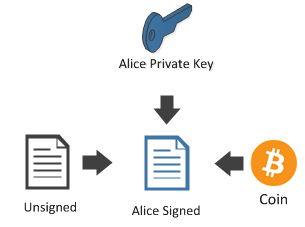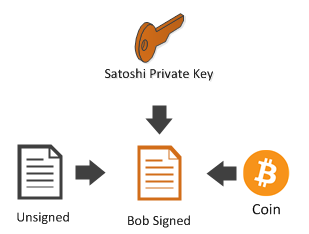Multi Sig
It is possible to have shared ownership over coins.
For that you will create a ScriptPubKey that represents a m-of-n multi sig, this means in order to spend the coins, m private keys will need to sign on the n different public key provided.
Let’s create a multi sig with Bob, Alice, and Satoshi, where two of them are needed to spend a coin.
Key bob = new Key();
Key alice = new Key();
Key satoshi = new Key();
var scriptPubKey = PayToMultiSigTemplate
.Instance
.GenerateScriptPubKey(2, new[] { bob.PubKey, alice.PubKey, satoshi.PubKey });
Console.WriteLine(scriptPubKey);
2 0282213c7172e9dff8a852b436a957c1f55aa1a947f2571585870bfb12c0c15d61 036e9f73ca6929dec6926d8e319506cc4370914cd13d300e83fd9c3dfca3970efb 0324b9185ec3db2f209b620657ce0e9a792472d89911e0ac3fc1e5b5fc2ca7683d 3 OP_CHECKMULTISIG
As you can see, the scriptPubkey have the following form: <sigsRequired> <pubkeys…> <pubKeysCount> OP_CHECKMULTISIG
The process for signing it is a little more complicated than just calling Transaction.Sign, which does not work for multi sig.
Even if we will talk more deeply about the subject, let’s use the TransactionBuilder for signing the transaction.
Imagine the multi-sig scriptPubKey received a coin in a transaction called received:
var received = new Transaction();
received.Outputs.Add(new TxOut(Money.Coins(1.0m), scriptPubKey));
Bob and Alice agree to pay Nico 1.0 BTC for his services.
So the get the Coin they received from the transaction:
Coin coin = received.Outputs.AsCoins().First();

Then, with the TransactionBuilder, create an unsigned transaction.
BitcoinAddress nico = new Key().PubKey.GetAddress(Network.Main);
TransactionBuilder builder = new TransactionBuilder();
Transaction unsigned =
builder
.AddCoins(coin)
.Send(nico, Money.Coins(1.0m))
.BuildTransaction(sign: false);
The transaction is not yet signed. Here is how Alice signs it:
Transaction aliceSigned =
builder
.AddCoins(coin)
.AddKeys(alice)
.SignTransaction(unsigned);

And then Bob:
Transaction bobSigned =
builder
.AddCoins(coin)
.AddKeys(bob)
.SignTransaction(aliceSigned);

Now, Bob and Alice can combine their signature into one transaction.
Transaction fullySigned =
builder
.AddCoins(coin)
.CombineSignatures(aliceSigned, bobSigned);

Console.WriteLine(fullySigned);
{
...
"in": [
{
"prev_out": {
"hash": "9df1e011984305b78210229a86b6ade9546dc69c4d25a6bee472ee7d62ea3c16",
"n": 0
},
"scriptSig": "0 3045022100a14d47c762fe7c04b4382f736c5de0b038b8de92649987bc59bca83ea307b1a202203e38dcc9b0b7f0556a5138fd316cd28639243f05f5ca1afc254b883482ddb91f01 3044022044c9f6818078887587cac126c3c2047b6e5425758e67df64e8d682dfbe373a2902204ae7fda6ada9b7a11c4e362a0389b1bf90abc1f3488fe21041a4f7f14f1d856201"
}
],
"out": [
{
"value": "1.00000000",
"scriptPubKey": "OP_DUP OP_HASH160 d4a0f6c5b4bcbf2f5830eabed3daa7304fb794d6 OP_EQUALVERIFY OP_CHECKSIG"
}
]
}
The transaction is now ready to be sent on the network.
Even if the Bitcoin network supports multi sig as explained here, one question worth asking is: How can you ask to a user who has no clue about bitcoin to pay on satoshi/alice/bob multi sig, since such scriptPubKey can’t be represented by easy to use Bitcoin Address like we have seen before?
Don’t you think it would be cool if we could to represent such scriptPubKey as easily and compactly as a Bitcoin Address?
Well, this is possible and it is called a Bitcoin Script Address also called Pay to Script Hash. (P2SH)
Nowadays, native Pay To Multi Sig as you have seen here, and native P2PK, are never used directly as such, they are wrapped into Pay To Script Hash payment.